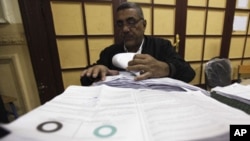Egyptian voters have overwhelmingly approved a referendum on constitutional changes, opening the door to early elections.
More than 14.1 million voters, or 77.2 percent, approved the constitutional amendments while 4 million, or 22.8 percent, voted against them. The government said Sunday the 41 percent turnout among the 45 million eligible voters broke all records for recent elections.
A number of "yes" voters said they supported the referendum in the hope it would restore stability after weeks of upheaval. Many were drawn to the polls in a massive, last-minute effort by the Islamist Muslim Brotherhood, Egypt's largest and best organized opposition group.
The Brotherhood and remnants of the former ruling National Democratic Party were the referendum's main supporters. They argued the election timetable would ensure a swift return to civilian rule.
Most secular groups and leading reform activists opposed the measure, saying they lacked time to organize into effective political organizations.
The referendum is considered the first test of the country's move toward democracy. It included nine constitutional amendments proposed by a panel appointed by the military, which has been leading Egypt since last month's ouster of President Hosni Mubarak.
Among those most fearful of the Brotherhood's rising power are Egypt's estimated 8 million Coptic Christians, whose leaders rallied the faithful to vote "no."
Essam el-Erian, a Brotherhood spokesman, rejected claims the group had exploited its religious influence to persuade voters. He hailed the results, saying most Egyptians want to move forward toward rapid change. It was the first time the Brotherhood had campaigned openly since the party was banned in 1954.
In the day's only reported violence, reform campaigner Mohamed ElBaradei and a group of his supporters were pelted with rocks, bottles and cans outside a Cairo polling center in an attack he blamed on paid followers of the old government.
One of the changes limits a president to two four-year terms, making Egypt one of the few Arab republics to set such a restriction. Mr. Mubarak had ruled the North African country for three decades.
The referendum's passage paves the way for presidential and parliamentary elections by the end of the year with the military relinquishing power in 2012. The results are likely to open a frenzied campaign season, with liberal, pro-democracy forces scrambling to put together political parties to contest the upcoming races.
Some information for this report was provided by AP and Reuters.




